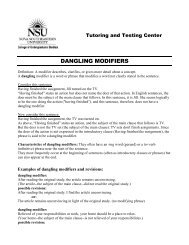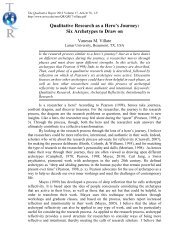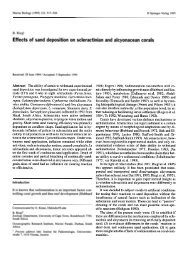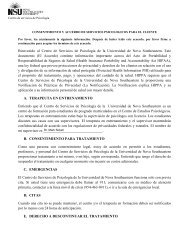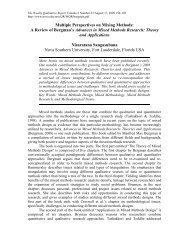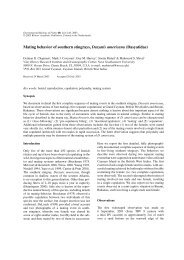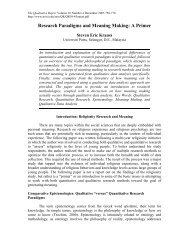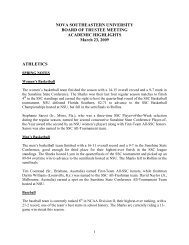Contextualizing Theories and Practices of Bricolage Research
Contextualizing Theories and Practices of Bricolage Research
Contextualizing Theories and Practices of Bricolage Research
Create successful ePaper yourself
Turn your PDF publications into a flip-book with our unique Google optimized e-Paper software.
Matt Rogers 7<br />
are always positioned from specific contextual perspectives. In this context, Denzin <strong>and</strong><br />
Lincoln suggest:<br />
The gendered, narrative bricoleur also knows that researchers all tell<br />
stories about the world they have studied. Thus the narratives, or stories,<br />
scientists tell are accounts coached <strong>and</strong> framed within specific storytelling<br />
traditions, <strong>of</strong>ten defined as paradigms (e.g., positivists, post-positivist,<br />
constructivism). (p. 6)<br />
Narrative bricoleurs appreciate how ideologies <strong>and</strong> discourses shape how knowledge is<br />
produced. Instead <strong>of</strong> taking these ideologies <strong>and</strong> discourses for granted, they seek to<br />
underst<strong>and</strong> their influence on research processes <strong>and</strong> texts.<br />
Narrative bricoleurs therefore attempt to trouble <strong>and</strong> avoid univocal research<br />
representations. This means that narrative bricoleurs draw their techniques from multiple<br />
perspectives, voices, <strong>and</strong> sources. A narrative bricolage is exemplified in Markham’s<br />
(2005) study <strong>of</strong> the meaning <strong>and</strong> consequences <strong>of</strong> a sexist phrase popular in her local<br />
community: “Go ugly early.” She explains that the phrase is understood as “a mission<br />
statement for a particular subculture <strong>of</strong> college life: Men who idealize the image <strong>of</strong> the<br />
stereo-typical American male whose primary goal in life is to have sex with as many<br />
women as possible, using whatever means available” (p. 2). Rather than assuming a<br />
univocal positioning within her study, Markham uses a narrative bricolage approach to<br />
employ multiple fragmented voices to interpret (<strong>and</strong> disrupt) the function, socio-political<br />
dimensions, <strong>and</strong> violent ramifications <strong>of</strong> the phrase in her broader university community.<br />
She explains that her complex narrative is “derived from research journals, field notes,<br />
actual transcripts <strong>of</strong> interviews <strong>and</strong> recorded conversations, fiction, <strong>and</strong> scholarly<br />
literature [to] present a bricolage <strong>of</strong> ideas <strong>and</strong> images” (p. 25). In this way, she uses<br />
multiple voices to show the demeaning <strong>and</strong> violent implications <strong>of</strong> the “go ugly early”<br />
discourse. She also explains how the use <strong>of</strong> “bricolage can function politically to<br />
encourage multiple perspectives” (p. 2). In this way, she may not only be a narrative<br />
bricoleur, but a political bricoleur as well.<br />
Clearly, Denzin <strong>and</strong> Lincoln (1999) consider bricolage to be more than multimethods<br />
research. They see it as an approach that enables researchers to respect the<br />
complexity <strong>of</strong> the meaning-making <strong>and</strong> inquiry process. In this way, it challenges the<br />
basis <strong>of</strong> traditional multi-methods research. For example, a bricoleur challenges the<br />
traditional principle that researchers should remain neutral observants in a research<br />
context. Rather than idolizing the perceived ability <strong>of</strong> detached neutrality, bricoleurs<br />
engage the political dimension <strong>of</strong> inquiry. I believe this recognition may have attracted<br />
Joe Kincheloe to bricolage. It is, therefore, to a discussion <strong>of</strong> his vision <strong>of</strong> bricolage as a<br />
critical research praxis that I turn next.<br />
Joe Kincheloe: Onto the Critical <strong>Bricolage</strong><br />
Kincheloe’s bricolage project, as described by Steinberg (2011), "criticalize[s]<br />
<strong>and</strong> rigourize[s] the traditional ways in which to do multi-methodological research" (p.<br />
176). In his criticalization, Kincheloe (2005b) moves Denzin <strong>and</strong> Lincoln’s (1999)



